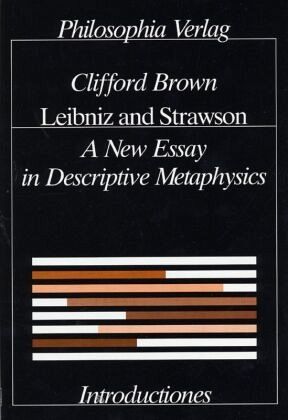Nicht lieferbar

Leibniz and Strawson
A New Essay in Descriptive Metaphysics
Versandkostenfrei!
Nicht lieferbar
This book deals with philosophical issues raised by P.F. Strawson in his Individuals. Strawson there provides a detailed criticism of Leibniz's metaphysics. The present volume argues that while Strawson may find his picture of Leibniz's world a useful foil for his own argument, that picture is fundamentally inconsistent with any possible world attributable to Leibniz himself, and even further removed from what Leibniz himself took to be the actual world.The importance of Leibniz's sources is stressed and documented, especially his correspondence with DeVolder and Des Bosses. But the focus of t...
This book deals with philosophical issues raised by P.F. Strawson in his Individuals. Strawson there provides a detailed criticism of Leibniz's metaphysics. The present volume argues that while Strawson may find his picture of Leibniz's world a useful foil for his own argument, that picture is fundamentally inconsistent with any possible world attributable to Leibniz himself, and even further removed from what Leibniz himself took to be the actual world.The importance of Leibniz's sources is stressed and documented, especially his correspondence with DeVolder and Des Bosses. But the focus of this book is not solely one of historical accuracy. Strawson's account of the nature of individuals has justifiably stirred great interest among contemporary philosophers, and this present reply to Strawson shows that certain perspectives of the historical Leibniz remain trenchant and relevant to the contemporary discussion of the issue involved.The author distinguishes three ontological levels for Leibniz and details the relations within and among those levels. A critical distinction between full and complete concepts is drawn, and it is further shown that Leibniz makes careful discriminations among the varieties of the principle of the identity of indiscernibles. It is argued that for Leibniz irreducible relations must necessarily obtain among individual substances, and that this claim does not violate the general framework of his logic. The reality of a public space and of bodies as the objective correlatives of our perceptions is maintained.The arguments are a substantive recasting of positions traditionally ascribed to Leibniz, and they will provide the basis for broad discussion and continuing research.Of interest to:Philosophers, historians of philosophy, logicians, theologists







